Miradije Gashi Sheremeti founded the Venera NGO in 2013, with the mission of providing free legal services and representation to Kosovar women struggling to enter the workplace. When she meets with K2.0 in Venera’s offices in Peja, she proudly shows off pictures of women that have been involved with the organization either as lawyers or as clients, and shares their success stories.
But with many complaints made on behalf of some of her clients gone unheard, Sheremeti is visibly exasperated. “They’ve lost all hope, it’s all been broken, all there’s left to do is get out,” she says.
Sitting at just 12.7 percent, Kosovar women face the lowest employment rate for women in Europe. Even more strikingly, only 20 percent of women are active in the labor force at all, meaning four out of five women in Kosovo are not only unemployed, but also not looking for work. These numbers are even lower for women that are younger, less educated, and living in rural areas.
Discussing these concerning trends with Luljeta Demolli, the executive director of the Kosovar Gender Studies Institute, she notes that low employment rates for women have been a major problem for years now, and they are slowly becoming worse than they were before the 1999 war. With participation at 35 percent in 2002, it is now just 20 percent.
These numbers are often simply attributed to the fact that Kosovo’s unemployment rate is high in general — at 30.6 percent of those economically active being unemployed in 2017, it is among the highest in Europe. However, it is no longer possible to deny that women face particular discouragement when it comes to looking for work, and that policy needs to respond accordingly.
The inactivity problem
A 2017 report from the World Bank on labor market trends in the region, showed that Kosovo had the highest disparity between labor market activity involving men and women. Using data from 2015, the World Bank reported that the difference was 38.6 percent in Kosovo, with Macedonia the next highest with 25.5 percent. By 2017, the disparity in Kosovo had risen to 45.7 percent.
The reasons for ‘economic inactivity’ are not as simple as women not perceiving themselves as ‘fit’ to work, or not wanting to. A recent study by the Ministry of Labor and Social Welfare found that women express almost as great of a desire to work as men do, but feel reluctant and doubtful about their opportunities.
The burden of unpaid care work and the continued responsibility Kosovar women feel toward familial duties have been repeatedly cited as the main barrier to women’s economic participation in surveys led by the government and international organizations assessing the problem in the region.
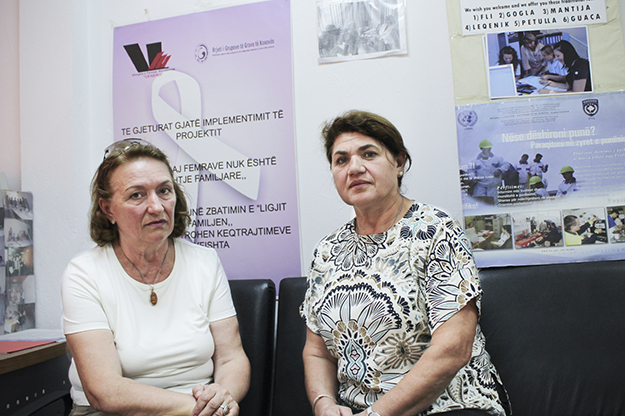
Miradije Gashi Sheremeti (left) provides legal services for women looking to enter the workplace, such as her client Fize Berisha (right), who believes women face a lot of discrimination when seeking employment. Photo: Agan Kosumi / K2.0.
Data collected in the 2014 Kosovo Labor Force Survey found that familial duty was by far the most prominent reason for women’s economic inactivity, with respondents that cited this reason estimated to make up about 38 percent of the female working-age population, by contrast to the 2.2 percent of working-age men for whom this was a barrier.
Far more women than men also said they were economically inactive because they believed that no work is available, and not without reason. Demolli notes that employment prospects for women are so dire, and wages are so low (often between 120-160 euros per month), that it often makes more economic sense for families to have the women remain at home.
Fize Berisha, who lives in Peja and is still searching for stable work in her field of agricultural engineering, believes “women have been discriminated against a lot, especially in the private sector. They’re forced into a position where they don’t even apply, because the conditions are so inadequate that they figure they’re better off staying at home with their kids, rather than wasting their time for 10 or 12 hours a day, when they’re not even paid for overtime.”
Maintaining occupational segregation
Traditional notions of the kind of professional work that is ‘fit’ for men and women respectively are not just fixtures of popular mentality, but have concrete impacts on women’s employment prospects.
Women in Kosovo continue to be overrepresented in educational, health, and garment sectors, and more likely to be working lower-tier and lower-paying jobs. Much of the work women do formally is an extension of the housework and carework they are already socialized to do from a very young age.
A.D., who lives in Peja and has been seeking a steady job there for over two years to no avail, says that there is a gendered division that is demanded from employers. “For example, there are several hiring calls that don’t specify whether the job is for a man or a woman, and when you go to the interview, they tell you that they were actually looking for a man,” she says.
A recent GAP Institute study found that in many instances, the job advert itself uses gender specific language. This is particularly so when it comes to high level positions, with women in this way being discouraged from applying, even when they are more than adequately qualified.
While high-level positions in public institutions often have their titles presented in the masculine form, lower-level positions are presented in the feminine. This problem is even more pronounced in the private sector, where the language of job postings will often outwardly specify the gender being sought for the position.
Jeton Mehmeti, the Research Director at the GAP Institute, tells K2.0 that despite the clear impacts the codified language has on hiring processes, it continues not to be considered a violation of the Law on Gender Equality by the relevant authorities.
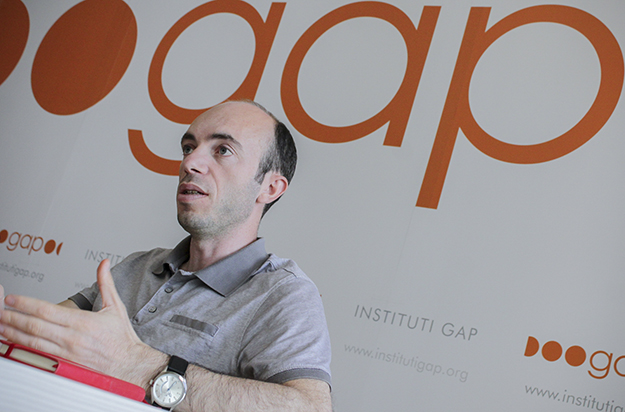
Jeton Mehmeti of the GAP Institute believes that the lack of rigorous standards being maintained in Kosovo’s labor market particularly impacts on women. Photo: Agan Kosumi / K2.0.
The private sector is not the only area in which the Law on Gender Equality appears to be weakly enforced. Despite the law having mandated equal representation in all legislative, judiciary, and executive bodies of government, a report in May showed that 94 percent of high-level positions in government are occupied by men.
A 2017 report by the Kosovar Gender Studies Center found that one of the greatest barriers to women holding decision-making roles has turned out to be mentality — men are still believed to be better leaders and attract greater political support.
Mehmeti tells K2.0 that the civil service’s failure to take substantive action on the problems caused by the lack of formality in Kosovo’s labor market particularly impacts women, and diminishes their participation in the workforce. With labor inspectors scarce, women are left vulnerable to widespread gender discrimination in all stages of the hiring process, as well as workplace harassment and exploitation, all with no accountability.
Berisha, meanwhile, believes that the private sector isn’t even worth applying to. “You’re not working 8 hours, but usually 10, or 12,” she tells K2.0. “They can change your work location to somewhere completely different, there’s hardly any vacation, and women have very short maternity leave. They don’t even let you switch a shift if you need to.”
Sheremeti, who has seen many of her clients deal with the same informality problems, believes that poor workers’ rights for women in the private sector is a major issue. “Often they will not even offer you a work contract, and if they do, they won’t adhere to it, and won’t pay you your fair share,” she says. “They create the conditions to keep you in a position where you are working for whatever wage they want, however they want, and doing whatever they want.”
A.D. says she once worked in an office for five years, not having a work contract for the first three. “When my contract came, I was relieved, I was finally registered as an employee, but to this day they still have not paid me my pension contributions. I was a registered employee there for those two years, and for those two years they haven’t paid me my contribution.”
“Institutions exist, and there are inspectors,” Sheremeti says, “but they are very dysfunctional. We have gone and made complaints, but they don’t function. You can walk up to them with the law in your hand, and they still won’t do anything.”
Mehmeti says these issues can be tackled with greater enforcement. “We need quotas. And not just quotas that get women hired into low-tier, dead end jobs, but quotas that ensure women are represented in the decision-making roles. Once women are hired, employers are often happy with their performance, and will rehire them without the necessity for quotas. But it is essential that we set up the circumstances for women to first be given a chance.”
The educational divide
The Center for Labor Studies notes that in comparison to other developing countries, women in Kosovo are particularly more disadvantaged than men when it comes to their educational attainment and employment prospects.
The 2016 Kosovo labor Force Survey reveals a huge disparity between men and women’s employment prospects based on education level. While employment rates for women that have only primary education are at 5 percent, the rate for men with the same education level is 30.2 percent.
Of the women that are economically active, those that have a university-level education have a 48 percent employment rate, while men at this level of education have a 68.7 percent employment rate. Men thus appear to be much more likely than women to be employed regardless of education status, while for women with only primary education, employment is near impossible.
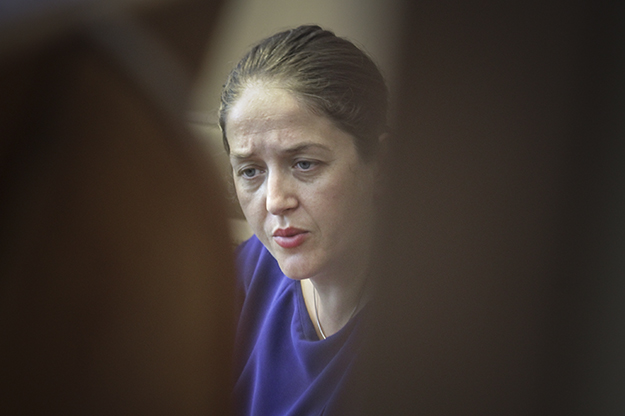
Luljeta Demolli of the Kosovar Gender Studies Institute feels that seeking employment requires a very different lifestyle than the reality lived out by many Kosovar women. Photo: Agan Kosumi / K2.0.
As education is a significant indicator for whether a woman will find formal employment at all in Kosovo, it reflects a major segmentation between women that can access it and those that have little hope of doing so. Demolli stresses that it really comes down to some women living a completely different kind of life.
“To look for work today, you need to have some money, you need to have training, you need to lead a public life — to go out, to socialize, to have a phone,” Demolli says. “Being employed or being able to look for work is a way of life that is different from the one that a large segment of Kosovar women live, and it is difficult to live it, because women here enter into life at a disadvantage in comparison to men. They inherit only 6 percent of their parents’ capital, and they make up only 9 percent of property owners. Low inheritances make it clear that wealth, capital, and money are for men.”
Aside from the vast population of women who do not have access to education and do not have hopes of entering the formal labor market, in 2015, the Ministry of labor and Social Welfare in Kosovo reported that women that were seeking work were more qualified on average than men based on education level, and yet still less likely to acquire a job.
If job-seeking women are more qualified than their male counterparts, this means that employed women also have a greater average educational attainment than employed men, because they are much less likely to be working if they have anything below a tertiary level of education.
This disparity is so pronounced that it offsets the gender wage gap in Kosovo, making it almost non-existent. Rather than serving as evidence of gender equality, a non-existent gender wage gap is a testament to how few women without higher education have formal economic opportunities compared to men, and does not account for the immense wealth disparity between men and women in Kosovo.
In search of comprehensive policies
One of the more contentious issues when it comes to accomodating for women’s participation in the labor market is maternity leave. Iliriana Banjska, who works as the gender analyst at the Kosovo Women’s Network (KWN), says that in the end of 2015, the Ministry of labor and Social Welfare was amending the Law on Gender Equality and requested her organization’s input.
KWN, much to everyone’s surprise, proposed to shorten maternity leave, because they saw that it was one of the reasons women were economically inactive. With the first three months requiring the employer to pay 70 percent of their wage, it placed a high burden on the private sector, which led to greater gender discrimination.
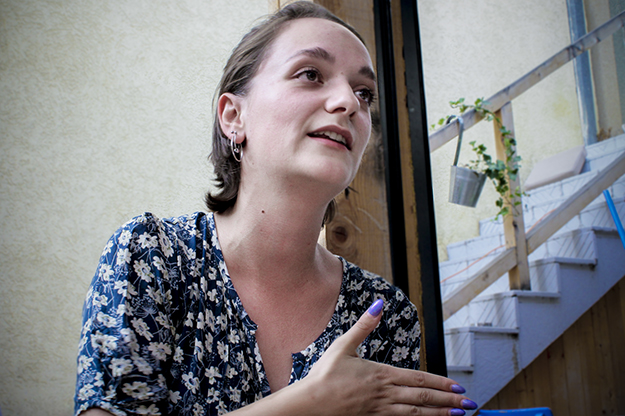
Kosovo Women’s Network’s Iliriana Banjska helped form her organization’s proposals to shorten maternity leave, arguing that it would help fight gender discrimination. Photo: Agan Kosumi / K2.0.
“We’ve seen that the longer women stay at home during maternity leave, the lower the chances are that they return to work, and the higher the chances are that they’re put in positions that are lower than what they had before,” Banjska explains. “Or they face other discrimination, such as breastfeeding provisions, or flexible working hours not being respected.”
When KWN proposed a balance between the leave that mothers and fathers could take, Banjska said this was not taken seriously despite the calculations proving that it would financially benefit both the family and the private sector.
After shutting down the suggestion in 2016, in 2017, the Ministry of Labor and Social Welfare received a European Project Association project, which would help them transpose European Union directives related to labor provisions into their national law, including parental leave provisions.
The EU’s parental leave provisions aim to minimize gender discrimination by normalizing parental leave for fathers. Banjska believes that this provision is especially important because one of the most prominent reasons women don’t get hired is because they are asked about their family plans during interviews.
“At some point, an employer will know it doesn’t matter if they have a man or a woman sitting in front of them during an interview — both of them at some point might take up leave provisions if they want to become parents,” she says.
According to Sheremeti, these questions about family plans are rampant throughout the hiring process, constantly affecting younger women’s chances of employment. “Often when you go to an interview, they require it as a condition that you have to be 20, 30, 35. But this is the age that women want to create families, and the employers, if they see that she’s in a relationship or beginning a family, they take them out of work. Now, at our age, since we’ve had children already, they look at us as old, and we don’t present this problem to them, but if they give us work they treat us like we’re disposable.”
It’s a view borne out by the experiences of A.D., who is younger and does not have children. “I am sharing my experiences because they are closely linked to the reality, it’s not as if this has just happened to me personally,” she says. “They ask you: ‘Are you engaged? Are you in a relationship?’ They say they just want to know whether you’re going to leave the job at a time that is inconvenient for them but these are personal questions.”
While institutional measures to ensure equal representation are invaluable, activists and women’s organizations stress that efforts to strengthen women’s participation will fall short if they do not also address the ways in which gender norms shape women’s ability to work at every stage of their lives.
Working age women in Kosovo are almost four times as likely not to work because of duties at home compared to other women in the EU — almost 40 percent compared to the EU average of 10 percent. Women will continue to bear most of the burden at home so long as men do not share it, and institutions addressing childcare and eldercare remain scarce.
The KWN states that meaningful advancement of women’s rights can only come when the value of this work is recognized, when its burden on women is reduced, and when it is fairly redistributed to men, communities, and the state.K
Feature image: Agan Kosumi / K2.0.
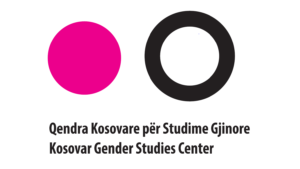 This publication has been produced with the assistance of the European Union, as part of a project implemented by Kosovo 2.0 and supported by the Kosovar Gender Studies Centre and Dora Dores. The contents of this publication are the sole responsibility of Kosovo 2.0 and can in no way be taken to reflect the views of the European Union, Kosovar Gender Studies Center and Dora Dores.
This publication has been produced with the assistance of the European Union, as part of a project implemented by Kosovo 2.0 and supported by the Kosovar Gender Studies Centre and Dora Dores. The contents of this publication are the sole responsibility of Kosovo 2.0 and can in no way be taken to reflect the views of the European Union, Kosovar Gender Studies Center and Dora Dores.





 This publication has been produced with the assistance of the European Union, as part of a project implemented by Kosovo 2.0 and supported by
This publication has been produced with the assistance of the European Union, as part of a project implemented by Kosovo 2.0 and supported by